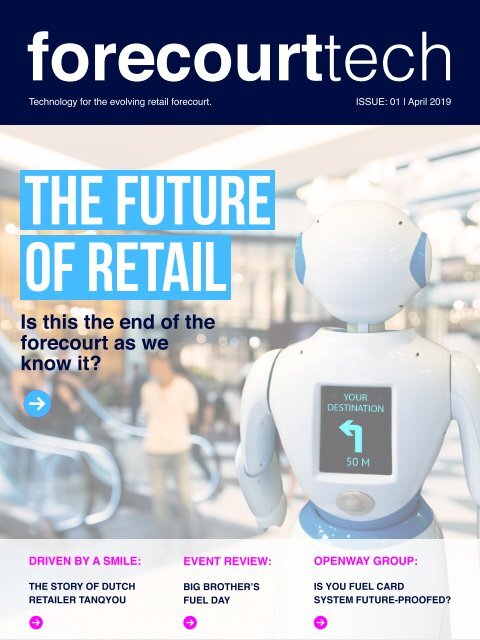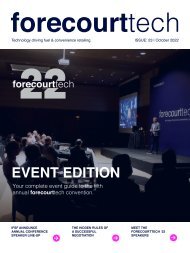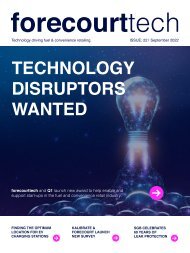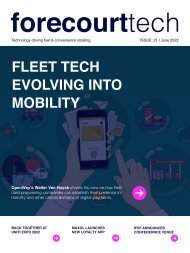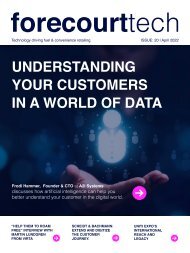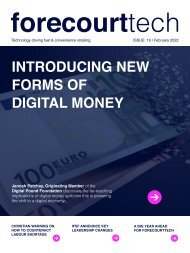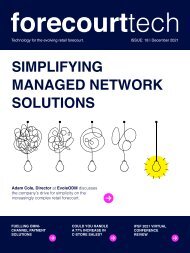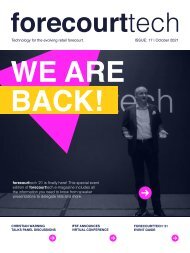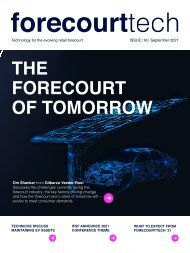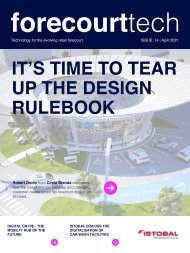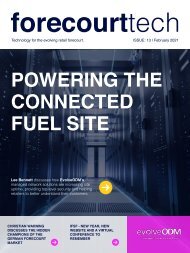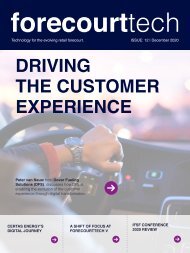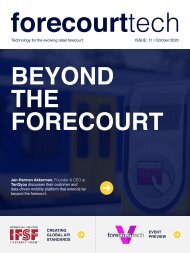forecourttech April 19
A monthly technology magazine for the evolving retail forecourt.
A monthly technology magazine for the evolving retail forecourt.
Create successful ePaper yourself
Turn your PDF publications into a flip-book with our unique Google optimized e-Paper software.
Technology for the evolving retail forecourt.<br />
ISSUE: 01 | <strong>April</strong> 20<strong>19</strong><br />
DRIVEN BY A SMILE:<br />
THE STORY OF DUTCH<br />
RETAILER TANQYOU<br />
EVENT REVIEW:<br />
BIG BROTHER’S<br />
FUEL DAY<br />
OPENWAY GROUP:<br />
IS YOU FUEL CARD<br />
SYSTEM FUTURE-PROOFED?
Explore how you can benefit from Way4 — openwaygroup.com<br />
fleet cards<br />
under<br />
contr<br />
l<br />
As a fuel retailer, you want a smooth journey for corporate drivers<br />
and the best experience at your petrol stations for individual customers.<br />
They deserve the most recent payment innovations you can offer.<br />
But if your card system or service provider is too slow to keep up,<br />
you lose control over how and when you roll out new services.<br />
By switching to Way4, an open digital payments platform, fuel retailers are securing their digital future<br />
by choosing a partner that lets them be fast & flexible.<br />
ADVANTAGES:<br />
— CROSS–BORDER CARD BUSINESS ON A SINGLE PLATFORM<br />
— ISSUING & ACCEPTANCE OF FUEL & BANK CARDS, LOYALTY & COMBINED CARDS<br />
— SET UP OF CARD PRODUCTS & TRANSACTION RULES WITHOUT SYSTEM CUSTOMIZATION & VENDOR INVOLVEMENT<br />
— REAL–TIME ACCOUNT UPDATES FOR FLEET MANAGERS & DRIVERS THROUGH WEB PORTALS<br />
— 24 / 7 / 365 SERVICE AVAILABILITY<br />
— MOBILE PAYMENTS, LOYALTY PROGRAMS BASED OF BASKET DATA ANALYSIS, DYNAMIC PRICING<br />
Join the fuel retailers worldwide who are using Way4 for card issuing, acquiring, switching,<br />
digital channels, mobile wallet, e–commerce gateway & loyalty.
<strong>forecourttech</strong><br />
Editors note<br />
welcome to <strong>forecourttech</strong> online, the new<br />
E-magazine enhancing the <strong>forecourttech</strong> brand and<br />
reporting on current and future technologies that optimise<br />
the operation of the retail forecourt and enhance the<br />
customer experience.<br />
The retail forecourt is quickly adapting to the digital<br />
revolution with many retailers understanding the<br />
advantages that it brings, such as higher efficiency in<br />
fuel management, improved pricing systems and higher<br />
customer loyalty. By digital we refer to cloud, analytics<br />
(including big data), mobility, interactivity (i.e. social<br />
networking), robotics, machine learning, artificial<br />
intelligence, the internet of things and multi-channel<br />
marketing.<br />
Fuel retailers are increasingly turning to digital<br />
technologies to not only build, operate and maintain fuel<br />
stations with greater safety and efficiency, but also to<br />
transform their mobility, fuels and consumer experience.<br />
Each month <strong>forecourttech</strong> online will feature views from<br />
industry associations, major fuel retailers and<br />
independent operators as well as reporting on developing<br />
technologies from global solution providers.<br />
The magazine will also serve as a promotional tool to<br />
report on and promote our annual conference and<br />
meetings Convention ‘<strong>forecourttech</strong>’.<br />
At ‘<strong>forecourttech</strong> online’ we look forward to receiving your<br />
views on the content and topics of interest. We are open<br />
to your comments, and will feature an industry opinion<br />
column in future issues as part of our commitment to<br />
bringing you news that is informative and educational<br />
pagethree<br />
I want to thank all those currently supporting the<br />
<strong>forecourttech</strong> brand, those that have supported this,<br />
the first issue of <strong>forecourttech</strong> online and look forward<br />
to building the brand awareness and readership as we<br />
progress.<br />
The <strong>forecourttech</strong> brand is owned and<br />
promoted by SAB Events Europe Ltd. All<br />
rights reserved.<br />
The views expressed in this magazine are<br />
those of the author and do not necessarily<br />
represent those of SAB Events Europe. No<br />
part of this electronic magazine may be<br />
copied or reproduced without the written consent<br />
of SAB Events Europe Ltd.<br />
Advertising:<br />
Steve Sanders<br />
steve@sabevents.eu<br />
Features:<br />
Wendy Taylor<br />
wendy@sabevents.eu<br />
SAB Events Europe Ltd.<br />
The Quadrant<br />
Surrey<br />
KT17 4RH<br />
www.sabevents.eu<br />
#<strong>forecourttech</strong> @<strong>forecourttech</strong> www.<strong>forecourttech</strong>.com
<strong>forecourttech</strong><br />
News round-up<br />
Automatic speed limiting technology is to be<br />
made standard on all new cars from 2022,<br />
under Europe-wide plans.<br />
Circle K has strengthened its electric vehicle<br />
initiative with high power charging stations<br />
from ABB.<br />
Tesla is upgrading its supercharging network<br />
to V3 for next-generation speeds.<br />
Amazon Go has a new competitor in grocery<br />
chain Meijer, which rolled out a new app this<br />
month letting shoppers scan items and pay<br />
on their mobile phones.<br />
Why big data is the future of self-driving cars.<br />
pagefive<br />
7-Eleven’s digital strategy is about expanding<br />
customer interactions.<br />
New research from Stanford University<br />
scientists demonstrates a new method for<br />
making hydrogen fuel directly from ocean<br />
water.<br />
According to research group IGD, over half of<br />
shoppers (54%) say they stop at a forecourt<br />
for food or drink regardless of whether they<br />
need fuel.<br />
Chevron has partnered with Microsoft to fuel<br />
digital transformation. Microsoft HoloLens<br />
makes sci-fi virtual teleporting a business<br />
reality for safer operations and to address<br />
issues more quickly.<br />
#<strong>forecourttech</strong> @<strong>forecourttech</strong> www.<strong>forecourttech</strong>.com
<strong>forecourttech</strong><br />
Driven by IT...<br />
and a smile<br />
Dutch company, TanQyou, is not your average fuel<br />
retailer. With a background in IT, Jan-Harmen Akkerman<br />
and his team had no experience in fuel retail before 2015.<br />
But putting their expertise to use they have created a<br />
streamlined digital experience that goes beyond the fuel<br />
pump and puts the fun back in to driving.<br />
pagesix<br />
Consumer habits are changing, technology is<br />
advancing and retailers are working hard to find ways to<br />
integrate new technologies for the benefit of customers and<br />
their business. For Dutch retailer, TanQyou, the process<br />
has been slightly different. The company, which was<br />
launched in 2015, was started not by fuel retail executives,<br />
but by IT professionals, and as such its very foundation is<br />
built on technology. Because of this TanQyou has been<br />
able to develop an innovative business model that rewards<br />
customers and encourages brand loyalty, despite the sites<br />
being unmanned.<br />
“We have a completely different perspective to traditional<br />
petrol retailers, explains TanQyou founder and CEO, Jan-<br />
Harmen Akkerman.<br />
“Traditional fuel retailers see delivering fuel to their customers<br />
as their main business stream with things like shop<br />
sales and EV charging as an extra. We see it the other way.<br />
Through our apps we are facilitating a mobile ecosystem<br />
and refueling is just one part of that. So whilst refueling<br />
is one of the main income sources for the business, our<br />
parking services, EV charging and shop sales are just as<br />
important,” he added.<br />
Jan started his other company, ICIT (internet bureau) – a<br />
full service digital agency, 18 years ago. The company<br />
provides services to multinational companies and it is<br />
through these years of expertise that Jan and his team<br />
have been able to carve out a unique place in the fuel retail<br />
market: “IT is the most important aspect in everything we<br />
do. We developed 99% of the techniques in house. The full<br />
company is built on this platform,” explains Jan.<br />
The company started when Jan purchased a 2.5 acre<br />
piece of land that had a license for a petrol station. “At first<br />
the goal was to rent the land to an oil company, but then I<br />
started to think that we could do this better, but not in the<br />
old way. So we started from scratch,” he explains.<br />
From scratch meant the IT experts putting their heads together<br />
to create their own fuel station management system.<br />
“We have our own POS and pump control systems – we<br />
made it lean, we made it simple. We looked at the business<br />
with a whole new perspective. We took the best bits of<br />
everything and only used external suppliers where they are<br />
really good at what they do. It allowed us to create a lean<br />
and mean forecourt,” said Jan.<br />
The platform has allowed TanQyou to engage with their<br />
customers in new and innovative ways with the aim to<br />
make refueling ‘fun and personal again’.<br />
“Competition in this market is high and we believe that you<br />
#<strong>forecourttech</strong> @<strong>forecourttech</strong> www.<strong>forecourttech</strong>.com
<strong>forecourttech</strong><br />
have to find other ways to connect to customers to be the<br />
first in line and the one stop shop solution on the entire<br />
mobility customer journey,” said Jan.<br />
The nearly <strong>19</strong>,000 TanQyou members benefit from periodic<br />
prize draws and happy hours via the MyTanQyou app. For<br />
every litre refueled, members get one entry into the draw<br />
where they stand a chance to win a whole range of prizes<br />
including cars, gadgets and vouchers. The loyalty app<br />
has proved a hit with customers. At the company’s original<br />
and largest location around 89% of customers are using<br />
the application with an average of 60% digitally recognised<br />
across TanQYou’s 24 locations.<br />
TanQyou’s main goal is to become “the platform” in the<br />
mobility services industry and aims to support this goal by<br />
expanding its fuel retail network into other parts of Europe<br />
over the next few years.<br />
pageseven<br />
Jan-Harmen Akkerman will give delegates and<br />
exclusive insight into TanQyou’s innovative approach to<br />
fuel retailing at <strong>forecourttech</strong> ’<strong>19</strong>. The presentation will<br />
focus on the use of online tools and optimising customer<br />
loyalty schemes.<br />
For more information visit www.<strong>forecourttech</strong>.com<br />
#<strong>forecourttech</strong> @<strong>forecourttech</strong> www.<strong>forecourttech</strong>.com
<strong>forecourttech</strong><br />
Fuelday for Retail<br />
A new name, a handful of (inter)national top speakers and lots of inspiration. Lots of inspiration.<br />
These were the main ingredients of BigBrother’s Fuelday for Retail. Ingredients that were eagerly<br />
consumed by more than 250 participants.<br />
Look further ahead<br />
Developments and changes in retailing countries are<br />
happening fast. What is new today is old again tomorrow.<br />
It is therefore important to keep up, writer and retail expert<br />
Steven van Belleghem outlined in a video at the start of the<br />
BigBrother congress in Ede in the Netherlands. “The cashless<br />
Amazon go is, after Apple Stores, the most lucrative<br />
retail formula in the world. It is not surprising that Amazon<br />
intends to roll out the concept quickly, also within petrol”<br />
Van Belleghem explained. He added that retailers have to<br />
embrace new technologies, such as systems that make<br />
cash-free shopping possible. Amazon Go uses cameras<br />
and sensors to detect what a customer is purchasing so<br />
when they are done they can simply leave the store and<br />
any purchases are paid for via their Amazon account. “It<br />
is about removing barriers”, says Frits Morrema, retail<br />
marketing & communication manager at Total Nederland.<br />
With his vision, he created the basis of Total’s COSIE shop<br />
concept. During the Fuelday for Retail he discussed the<br />
background of the idea. “The gas station is often classified<br />
as expensive and uncomfortable. We want to change that.<br />
COSIE stands for barista quality coffee, fresh juices and<br />
surprising sandwiches in a modern, welcoming and atmospheric<br />
environment, an environment where people like to<br />
stay.” Morrema made it clear to the public that a vision, a<br />
goal and a strategy are important factors of success, but<br />
that these should be combined with passion. “From management<br />
to employees on the floor; everyone has to stand<br />
behind and go for it. Only then will you achieve the goal<br />
of higher frequentation, more satisfied guests and higher<br />
spending. “<br />
Customer data the basis of development<br />
The customer is also central at Shell. Customer data is an<br />
important starting point for new developments at the oil<br />
giant, Dan Jeavons said. He is general manager of Data<br />
Science at Shell, a department that is primarily concerned<br />
with the development of smart learning software. The new<br />
Shell Go + savings program, and its backend technology,<br />
is an example of this. Through this intelligence programme,<br />
Shell collects data and subsequently uses it for customer-specific<br />
rewards, among other things. Dan displayed to<br />
the conference participants a picture of all the possibilities<br />
that data the oil company offers. In the field of developing<br />
sustainable forms of energy, the company has also set<br />
itself the goal of halving its CO2 footprint by 2050 compared<br />
to today. Through all kinds of projects, events and<br />
hackathons (a meeting of software and website developers,<br />
designers and business strategists to work on a theme<br />
together).<br />
It was a beautiful and unique insight into the “new” world of<br />
Shell. It is an approach that received approval from Belgian<br />
trend watcher Rik Vera (pictured below). “Data ensures<br />
that retailers get to know their customers and can develop<br />
very focused concepts.” But there are conditions attached<br />
to that concept development, Vera explains. “No less than<br />
70 percent of retailers are busy with today, 20 percent with<br />
tomorrow and only 10 percent with the day after tomorrow.<br />
Only the latter group is doing well, when you come up with<br />
new things you have to look further ahead than just today<br />
or tomorrow.” He compares it with Uber. “Uber is thinking<br />
strongly about the future. Uber is not a taxi company at all,<br />
they have long looked ahead. Their app will soon be leading<br />
if the self-driving car is commonplace. Take it from me.”<br />
To illustrate his point, Vera used the analogy of a beach<br />
chair: “If all beach chairs are rented out, after a while the<br />
entrepreneur will optimise the rental - the chairs get a colour,<br />
they are not rented per day but per hour and also the<br />
chairs are smaller and placed closer together so that more<br />
fit on the beach. And then…. then there will be a tsunami.<br />
The sea recedes and the beach first becomes larger, with<br />
space to place even more seats. The entrepreneur does<br />
that too and suddenly, the tsunami engulfs everything. That<br />
tsunami is the disruptor!”<br />
pagenine<br />
#<strong>forecourttech</strong> @<strong>forecourttech</strong> www.<strong>forecourttech</strong>.com
The end of the<br />
forecourt as we<br />
know it?<br />
The end of the forecourt is nigh. It seems an ominous statement and perhaps for the few<br />
inexorable retailers resisting change, it is. For others, change presents exciting new<br />
opportunities for innovation and growth. Mark Wohltmann, Director of NACS Europe<br />
outlines some the opportunities and threats technology presents to the fuel retail industry.
<strong>forecourttech</strong><br />
The retail industry is evolving rapidly. The way people<br />
shop is changing and the retailers that are embracing the<br />
shift in consumer habits are the ones who will continue to<br />
thrive in the years to come.<br />
“When it comes to technology and how it will impact retail<br />
there are two different sides, the consumer side and the<br />
business side. Both elements are changing and progressing<br />
massively,’ explains Mark Wohltmann, Director of NACS<br />
Europe, a global convenience association dedicated to<br />
advancing convenience and fuel retailing globally. So in<br />
this rapidly progressing industry, what are the key trends<br />
that will shape the fuel retail sites of tomorrow?<br />
Mobile payments & loyalty<br />
In recent years there has been a significant rise in mobile<br />
payment solutions. For many customers this is seen as a<br />
convenient and efficient method of payment and for the retailer<br />
it generates volumes of consumer point-of-sale data.<br />
“Mobile payment applications is a development that everyone<br />
picked up on,” explains Mark.<br />
“What we have seen so far is larger companies investing<br />
in their own solutions, but that might change in the future.<br />
As a consumer the one thing you don’t want is to have 25<br />
different apps to use at 25 different retailers. Retailers need<br />
to find a balance between being open to the possibility of<br />
consumers using multi-site platforms at the pumps and in<br />
store but also being closed to protect their valuable loyalty<br />
data. We hear these discussions everywhere we go,” he<br />
added.<br />
A survey by Synchrony Financial in 2018 highlighted<br />
consumers’ willingness to download retailer mobile apps.<br />
The report recommended that retailers create mobile apps<br />
to bring together user experience opportunities and to<br />
engage customers with personalised offers and discounts<br />
that promote brand loyalty.<br />
“Retailers that have a fully integrated payment and loyalty<br />
solutions are able to gain really valuable insights. What I<br />
really like is when retailers use these platforms to enhance<br />
traditional marketing technique. So, for example, some<br />
retailers already implemented social promotion: if you sign<br />
up to a retailer’s app you get promotional offers that you<br />
can share with friends via email or text. They must then<br />
download the app to use it. It’s word of mouth marketing in<br />
the digital age,” added Mark.<br />
Big Data<br />
Data is king in this digital space and retailers that are able<br />
to access high quality data and know how to use it are able<br />
to gain huge competitive advantage. The idea of collecting<br />
data is not new. For hundreds of years businesses have<br />
kept records of their clients to maintain service levels,<br />
market new products or to simply stay in touch. The data<br />
available in the digital era however goes far beyond this.<br />
Retailers now have access to vast sums of data from multiple<br />
sources in real time, which if analysed properly can<br />
offer unique insights into consumer trends and behaviours.<br />
Big data, as the name would suggest, is often so large and<br />
complex that it goes beyond traditional analysis methods.<br />
Artificial intelligence and algorithms can help businesses<br />
make sense of the extremely large and constantly evolving<br />
data sets.<br />
“Big data is not just ‘lots of data’, it is about the wealth of information<br />
hidden behind it and only being useful once you<br />
combine and analyse it. A lot of companies really struggle<br />
bringing data together and they don’t have the man power<br />
or the resources to work with it. What will help them is machine<br />
learning and algorithms that does the work for them,”<br />
explained Mark.<br />
“Recently I spoke with a company that runs fleet cards<br />
and they decided to start looking further into their data to<br />
see what they could unearth. They found that they could<br />
predict well in advance when a fleet customer was at risk<br />
to move to another retailer by looking at their card-usage<br />
behaviours. As a retailer if you can access insights like this<br />
you can then adopt a more proactive approach and reach<br />
out to the customer, offer them a discount, show they are<br />
valued and perhaps prevent them from leaving.”<br />
pageeleven<br />
#<strong>forecourttech</strong> @<strong>forecourttech</strong> www.<strong>forecourttech</strong>.com
<strong>forecourttech</strong><br />
pagetwelve<br />
Electric vehicles<br />
As car manufacturers and governments look for ways to<br />
meet global climate targets, electric vehicles are being<br />
viewed as a possible solution to the problem. This in itself<br />
requires a huge change in consumer habits with even the<br />
fastest chargers on the market taking around 20 minutes to<br />
charge the battery to 50%, considerably longer than refuelling<br />
with petrol or diesel.<br />
“We all know it will change our industry, it will turn things<br />
upside down,” said Mark.<br />
“It might take a while but more and more I believe it will<br />
happen sooner than most of us think. Companies like BMW<br />
announced that in just a couple of years time they will have<br />
a fully electric model in every range. If all car manufacturers<br />
adopt a similar approach then this will really change the<br />
dynamic. If suddenly manufacturers are mass producing<br />
electric vehicles then we will see a reduction in price and<br />
more electric vehicles on the road. Retailers are aware of<br />
these changes and they are all looking in to what the future<br />
might hold.”<br />
With longer wait times this produces a unique opportunity<br />
for retailers to draw customers in to the stores, but just<br />
because they are there with nowhere else to go, it does not<br />
guarantee they will engage with the store.<br />
“On a recent trip to Norway I visited a petrol site that had<br />
10 chargers on the rear parking lot. It was lunchtime and all<br />
10 were occupied but all of the drivers were sat in the car<br />
on their phones, none were in the store. If a customer goes<br />
to a site and spends 30 minutes on charge but not in the<br />
store then it becomes clear that they don’t have the right<br />
infrastructure,” explains Mark.<br />
Destination forecourt<br />
“Traditionally you would you go to a c-store either because<br />
it is the only one open and everything else is closed or it is<br />
conveniently located on your journey. Suddenly with developing<br />
technology this called all disappear. If you have an at<br />
home electric charger, you won’t need to fuel anymore and<br />
if the likes of Amazon can deliver emergency purchases<br />
within an hour, you have no reason to go out. This means<br />
the fuel retail site has to become a destination not a stop<br />
over,” explained Mark.<br />
“We need to start thinking about destinations rather than<br />
c-stores. For rural communities a fuel station can become<br />
a community hub or due to more and more people working<br />
In a world with self drive cars, who decides<br />
where to stop and refuel?<br />
#<strong>forecourttech</strong> @<strong>forecourttech</strong> www.<strong>forecourttech</strong>.com
<strong>forecourttech</strong><br />
remotely it could become a co-working space. Retailers<br />
then need to think more about the in store experience. Just<br />
one great example of this is Maxol in Ireland, who won an<br />
Honourable Mention for their M3 Mulhuddart motorway<br />
station at the NACS International Convenience Retailer of<br />
the Year Award in 2017. They have a range of food offers<br />
and children’s play areas, so families go there because<br />
they want to. They leave home in their car with a motorway<br />
station in mind,” he added.<br />
Whilst convenience can be easily achieved online, more<br />
and more online retailers are investing in physical stores to<br />
deliver experience to their customers. China’s online retailer<br />
Alibaba is using a ‘New Retail’ model to meld the online and<br />
offline experience. In the last year they have opened 65 retail<br />
sites, that use mobile apps, online payments and a host<br />
of other cutting-edge technologies to provide a unique customer<br />
experience. Customers can even order from home<br />
and typically, customers within a three-kilometre radius can<br />
receive their groceries within 30 minutes.<br />
“In a recent discussion with Alibaba in China, they explained<br />
to us why they, as an online retailer, are opening<br />
physical stores: ‘We need stores to deliver experience. It’s<br />
not necessarily about selling but building the relationship,<br />
allowing customers to connect, trust and get to know the<br />
brand’, something that our industry truly has an advantage<br />
in that we can utilize,” explained Mark.<br />
Self drive cars<br />
Self-driving cars are here. Whilst mass adoption is still a<br />
way off, the technology is there.<br />
“It all comes down to owns the customer of the future. At the<br />
moment if a customer wants a drink they decide where to<br />
stop. If there is a self driving vehicle then who tells it where<br />
to stop? Is it Google because the data is based on maps?<br />
Is it the customer? Does the vehicle make the decision<br />
based on consumer habits or companies’ promotions? This<br />
question has not yet been answered. It is a threat and an<br />
opportunity,” said Mark.<br />
“At the International Forecourt<br />
Standards Forum (IFSF), we are<br />
following all of the trends that Mark<br />
has highlighted above with interest.<br />
We certainly agree that those who<br />
do not embrace these changes are in danger of being left<br />
behind. What we are seeing is that to allow the fuel retailing<br />
landscape to keep up with and hopefully lead other market<br />
segments, all elements of the forecourt and backcourt need<br />
to be able to easily interface not only with each other, but<br />
also with the myriad of platforms now hosted in the “cloud”.<br />
In order for this to happen, all parties need to use standards<br />
not just within their own geography and segment, but<br />
globally, to be able to benefit from break-in technologies<br />
from existing software and hardware vendors, plus new<br />
innovators. To this end, IFSF provides standards and<br />
implementation guides that allow for the interoperability of<br />
the new technologies along with the legacy technologies<br />
enabling fuel retailers to operate and offer both for many<br />
years to come.”<br />
Heather Price, Chair, IFSF<br />
pagethirteen<br />
Mark Wohltmann will be discussing ‘The end of the<br />
forecourt as we know it’ at <strong>forecourttech</strong> ’<strong>19</strong>. The key<br />
note presentation will feature exclusive insights from the<br />
most recent NACS Global Issues Survey on technology<br />
and will look at trends and disruptors as well as examining<br />
how emerging technologies could change the way<br />
consumers interact with the c-store, that may fundamentally<br />
change the face of fuel retailing and forecourt<br />
convenience as we know it.<br />
For more information visit www.<strong>forecourttech</strong>.com<br />
#<strong>forecourttech</strong> @<strong>forecourttech</strong> www.<strong>forecourttech</strong>.com
<strong>forecourttech</strong><br />
Supplier news<br />
Car wash manufacturer, ISTOBAL, will<br />
present ‘Smartwash’ at The Forecourt Show<br />
20<strong>19</strong> in Birmingham, UK from 8-10 <strong>April</strong>.<br />
Smartwash is a pioneering new technological<br />
concept for digitalising car wash facilities<br />
LED lighting specialists, Bever Innovations,<br />
has successfully partnered with Distec<br />
Graphics and LED signage company based<br />
in Guatemala to provide lights for their LED<br />
price displays.<br />
pagefourteen<br />
In their latest blog post, Igenico Group<br />
examine connected cars, the technology<br />
powering them and what this means for<br />
commerce.<br />
Tim Hoffmeister is to become the CEO of<br />
Implico Group. Tim joined the company in<br />
September 2018 as Chief Financial Officer.<br />
The new role will focus on strategic<br />
development.<br />
Kalibrate’s User Conference 20<strong>19</strong> brought<br />
fuel and convenience retailers together in<br />
San Diego for two days of discussions and<br />
networking. Here they outline the highlights<br />
and takeaways.<br />
Scheidt & Bachmann and Worldline have<br />
announced a new partnership that will enable<br />
future proof card processing at fuel stations.<br />
#<strong>forecourttech</strong> @<strong>forecourttech</strong> www.<strong>forecourttech</strong>.com
<strong>forecourttech</strong><br />
Gilbarco Veeder-Root is full charged and<br />
ready to deliver electric vehicle charging to<br />
Europe’s forecourts. In October last year the<br />
company made a minority investment in<br />
Tritium, a privately held EV charging<br />
technology leader, to enable the retail fueling<br />
technologies business to meet progressive<br />
customer needs in the face of the e-mobility<br />
revolution.<br />
IFSF Chairman, Heather Price, has been<br />
announced as the conference programme<br />
moderator for <strong>forecourttech</strong> ‘<strong>19</strong>. Heather was<br />
joined IFSF in 2018 and was<br />
formerly Business IT Manager, EAME for<br />
Fuels & Lubricants with ExxonMobil.<br />
pagefifteen<br />
The NACS Convenience Summit Europe will<br />
take place from 5-7 June in London, UK.<br />
The event will be hosted by NACS Director of<br />
Europe and <strong>forecourttech</strong> ‘<strong>19</strong> speaker, Mark<br />
Wohltmann. Registration is now open.<br />
Dover Fueling Soultions (DFS) has signed<br />
a new five -year deal with EG Group. The<br />
agreement will see DFS provide wetstock<br />
management solutions to EG Group’s sites<br />
worldwide.<br />
Accenture has invested in and formed an<br />
allinace with P97 Networks, a leader in cloudbased<br />
mobile commerce, in-vehicle<br />
payments and digital marketing solutions for<br />
the convenience retail, fuel and vehicle<br />
manufacturing industries.<br />
The Smart Payment Association’s (SPA) latest<br />
paper addresses the protection problem surrounding<br />
IOT payments.<br />
#<strong>forecourttech</strong> @<strong>forecourttech</strong> www.<strong>forecourttech</strong>.com
<strong>forecourttech</strong><br />
Is your fuel<br />
card system<br />
future-proofed?<br />
- A checklist for CEOs and CIOs<br />
pagesixteen<br />
This checklist was designed by Walter Van Huyck, an<br />
expert in fleet card systems who has led the<br />
development and marketing of international fleet card<br />
systems for major fuel retailers, such as Lukoil and<br />
ConocoPhillips. Now Walter works as Business<br />
Relationship Manager at OpenWay, a software provider<br />
of fleet card issuing and acceptance solutions.<br />
Everyone loves changes, nobody wants to be changed. Payments are one of the most<br />
dynamic areas in the fuel retail business, encompassing how customers pay at fuel<br />
stations, how fleet companies control their fuel expenses, and how merchants motivate<br />
customers to pay faster and buy more. At some point, to meet the ever-changing customer<br />
expectations, you have to look at your current fuel payment system and ask yourself: ‘Is it<br />
still fit-for-purpose? Do we need to change?’<br />
Your system probably fits the needs of your business now and for a couple of years into<br />
the future. But will this still be the case in 2022? We encourage you to challenge yourself. Is<br />
your current system for managing fuel card payments ready for your “next big thing”?<br />
#<strong>forecourttech</strong> @<strong>forecourttech</strong> www.<strong>forecourttech</strong>.com
<strong>forecourttech</strong><br />
CEO CHECKLIST<br />
1.Does your system support business<br />
growth?<br />
This is the most important question. When you<br />
expand cross-border, your fuel card system should<br />
support multi-currency payments and be compliant<br />
with local accounting regulations. If you acquire or<br />
merge with another fuel company, the system should<br />
be able to handle multiple entities, with streamlined<br />
card payments operations across all business units.<br />
Furthermore, if you have a successful year and double<br />
your customer base, your system should be able<br />
to process increased volumes without issues. Modern<br />
systems provide scalability and do not limit your<br />
growth opportunities.<br />
2. Are you flexible enough to provide<br />
the best experience for your<br />
customers?<br />
As a fuel retailer, you want the best service experience<br />
at your petrol stations for corporate drivers and<br />
individual customers alike. They deserve the latest<br />
payment innovations you can offer. But if your card<br />
system or service provider is lagging behind, you lose<br />
control over how and when you roll out new features.<br />
For example, real-time payments have become a<br />
game changer for corporates. Your system should<br />
be able to check the limits, assess risks, calculate<br />
the best price, and apply discounts – all online and in<br />
real-time. Fleet managers expect to see the updated<br />
balance just moments after the top-up.<br />
For individuals, mobile and wearable payments<br />
can be a good differentiator. If drivers prefer to pay<br />
without leaving their car, then petrol stations should<br />
be able to accept this type of payment – whether it<br />
is QR-code, NFC, or in-app based. Sometimes, such<br />
innovations bring even more value to the business.<br />
One of our customers now delivers a fuel card directly<br />
to the driver’s mobile app. Users pay at stations by<br />
scanning a barcode. No plastic card is needed. They<br />
can check the balance and amount available on their<br />
account, limits on petrol types and car services in<br />
real-time. For the fuel company, it has brought significant<br />
savings on plastic card issuance and eased the<br />
pressure on customer support staff.<br />
3. Is your business compliant?<br />
If you operate in Europe, your system supports the<br />
IFSF standards as a matter of course. But recently<br />
there have been a few regulation changes that do<br />
not apply to the fuel business directly but mandate<br />
changes in business processes around customer<br />
data and the security of payments, e.g. GDPR, PSD2.<br />
Can your system adopt theses new requirements<br />
easily?<br />
4. How does card management fit in<br />
your business ecosystem?<br />
B2B customers expect to be onboarded just in hours<br />
or days, not months. Also, they want to perform most<br />
fuel card operations via online portals and mobile<br />
apps. At the same time, fleet managers prefer to receive<br />
reports on fuel expenses in near real-time. This<br />
means that the whole business should work as a welloiled<br />
machine, without interruptions and bottlenecks.<br />
This can be achieved if the core payment platform is<br />
truly online and integrates with other business-crucial<br />
components through standard, open APIs. This<br />
delivers business automation and enhances customer<br />
service.<br />
5. Do you have enough control over<br />
business development and service<br />
quality?<br />
Want to set up a new rule for price calculation for<br />
VIPs or launch a new card for tourists? How long will<br />
it take for the IT team to satisfy your request? Also,<br />
controlling service quality can be a pain point for<br />
companies that rely on third-parties to run their card<br />
business. For some types of fleet companies guaranteeing<br />
100% service stability is a must. As an IT<br />
director of a major fuel network that uses our platform<br />
puts it: “It is not the end of the world, if a person can’t<br />
pay at the supermarket because of system downtime.<br />
But ambulances can’t be kept waiting at our stations.<br />
It may cost a life and it will definitely cause fines and<br />
reputational damage for us”.<br />
pageseventeen<br />
#<strong>forecourttech</strong> @<strong>forecourttech</strong> www.<strong>forecourttech</strong>.com
<strong>forecourttech</strong><br />
CIO CHECKLIST<br />
1.How quickly can you support requests<br />
from business?<br />
Normally, a new product feature should be a matter<br />
of configuration, not a heavy customization exercise.<br />
And your team should be able to do this without<br />
vendor involvement. Sometimes new functionality can<br />
be a challenge if the current system was tailor-made<br />
for your company. You cannot always benefit from developments<br />
made for other users. So, a standardized<br />
off-the-shelf solution could be the answer.<br />
3. Do you have enough control over<br />
your system?<br />
In-house vs. outsourced operations? There is no right<br />
answer here. An in-house system means agility and<br />
full control over your business, which comes together<br />
with significant investment in the team and infrastructure.<br />
On the other hand, outsourcing card operations<br />
means almost no levers of influence on the product<br />
roadmap and service stability. A good alternative<br />
can be to run your system in the cloud, thus cutting<br />
infrastructure costs while still retaining control over<br />
the product.<br />
pageeighteen<br />
2. Calculate how much money you<br />
spend on payment systems integration<br />
Maybe it is high time to optimize the architecture to<br />
remove redundancy and complexity. For example,<br />
some of our customers manage card issuing, acquiring,<br />
and transaction switching for several countries<br />
on a single platform. This centralization delivers<br />
maintenance and vendor management savings. If you<br />
migrate data from legacy systems, the new system<br />
should be able to accommodate customer data, so<br />
that unification does not cause a loss of valuable<br />
information.<br />
Summary<br />
Assessing your card payment systems is not an<br />
exercise to be undertaken daily or even monthly.<br />
But some factors, such as a business expansion<br />
strategy targeting new geographies or customer<br />
segments can trigger the change and open new<br />
doors.<br />
To consult our experts or learn how the fuel<br />
companies drive a better customer experience<br />
on WAY4, the leading digital payments platform,<br />
visit our website.<br />
OpenWay Group is a global developer of WAY4, the top-ranked open digital payment software<br />
platform covering card issuing, acquiring, switching, digital channels, mobile wallet, loyalty, and<br />
fleet cards. WAY4 is the choice for fuel companies looking for revenue-generating,<br />
cost-efficient, real-time payment processing. It offers product and service flexibility, dynamic<br />
pricing, event-driven architecture, innovation, scalability, and high performance.<br />
#<strong>forecourttech</strong> @<strong>forecourttech</strong> www.<strong>forecourttech</strong>.com


